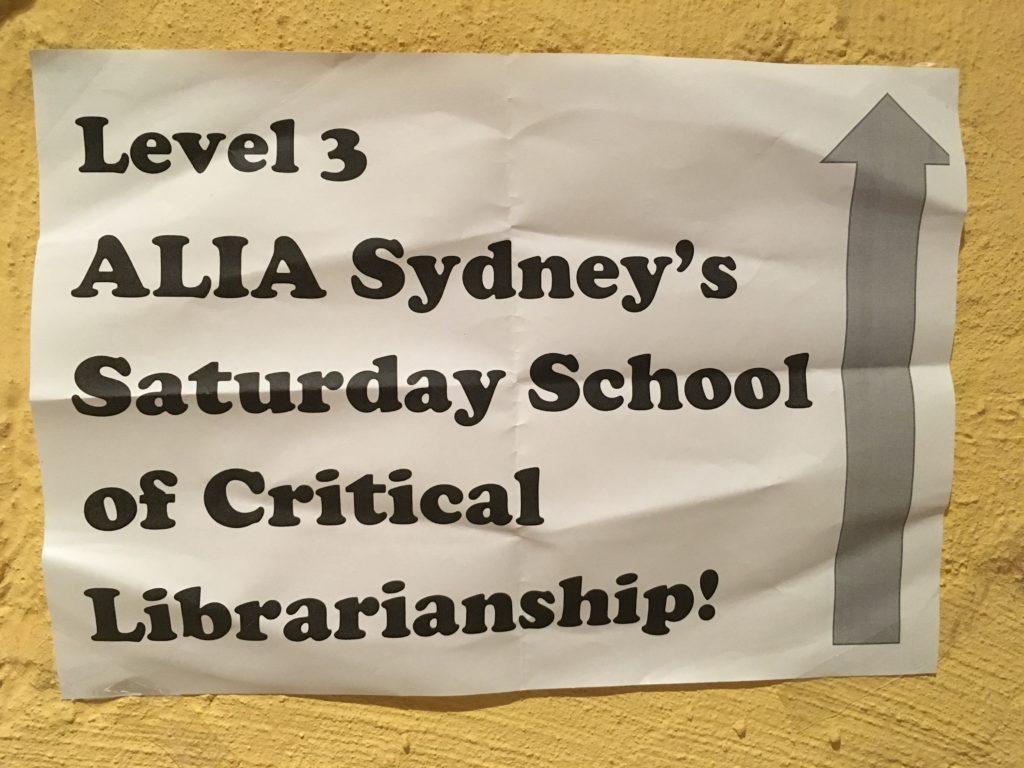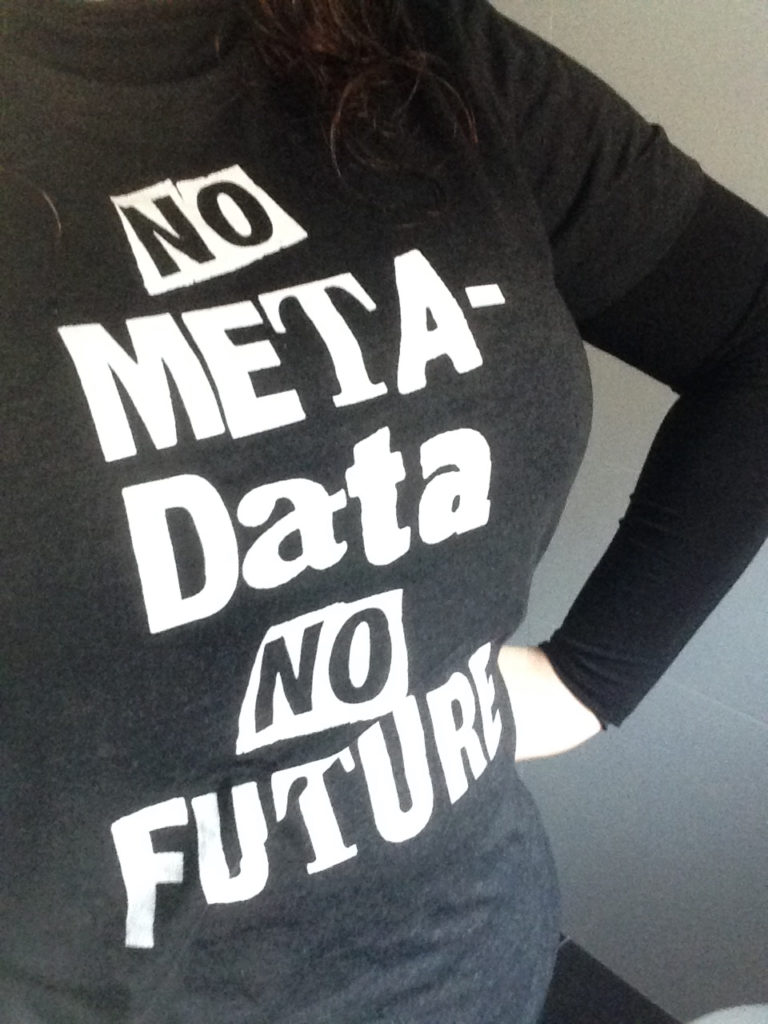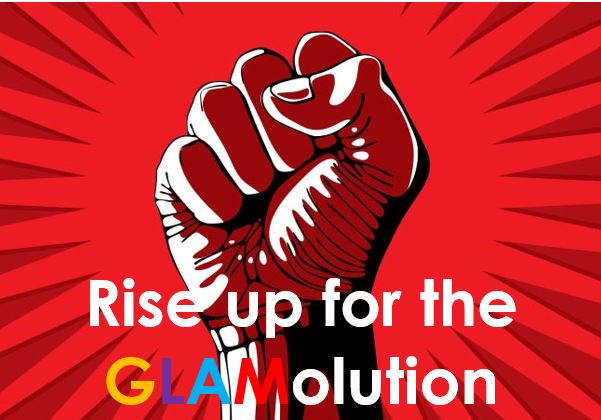
ALIA Sydney recently hosted their first Saturday School of Critical Librarianship, a gathering for critically- and radically-minded librarians to talk shop and take stock. It was a seriously full-on day. I spent most of today sleeping it off, and there’s a worryingly large memory gap where a lot of yesterday should have been. But I did remember to jot down a few not-terribly-insightful thoughts.
We are worthy. I awoke in a spaceship at sunrise, to a blistering Twitter discussion on the merits of metadata. (Sounds blissful, really.) I was staying in a capsule hotel, because it turns out Sydney has one and I wanted to try it out, but it was very poorly ventilated and I didn’t get a great sleep. The hot topic of discussion at 6am turned out to be the Digital Public Library of America (DPLA), broadly the American equivalent of Trove or Europeana, laying off several staff, apparently including their metadata librarian. Cue spirited conversation about the value institutions place, or don’t place, on their metadata workers. Perversely it was a bit of a personal mood boost:
Honestly existential cataloguing angst at 6am on a Saturday having slept in a spaceship is the mood boost I needed to explain to a bunch of people today why this shit matters. Genuinely. Metadata is just as important as other facets of LIS, and today I’m gonna demonstrate why.
— Alissa M. (@lissertations) 9 November 2018
Metadata is also worth paying (skilled staff) for, and if you’re running a library, digital or otherwise, that isn’t prepared to do this… you may as well pack up and go home.
— Alissa M. (@lissertations) 9 November 2018
We are facilitators. The word ‘facilitator’ kept cropping up, and it wasn’t just because a few of us had been asked to ‘facilitate’, or lend our expertise to, various breakout sessions. Instead the word arose organically as a way to describe how we might envision a future, more critical (or radical) librarianship. Historically our profession has been structured around either having the answers or knowing where to find them (that is, in our collections), but might we instead take our lead from our patrons and communities? Whether it’s building collections, planning programs or cataloguing our library’s contents, there’s a lot to be said for not just listening to, or consulting with, our patrons—but actively listening to how their collections and programs and knowledge and memory ought to be managed, which we could then use our LIS skills to make happen.
We are, um, not all cataloguers. I stayed for all three iterations of the rotating breakout discussions on cataloguing, as I had been asked to help guide this discussion (I tried to move to another topic but found myself blurting out ‘my people need me’). I’m sorry to say that I don’t think I did a very good job. I wish I’d been better prepared and had more structured discussion topics. As it was, the conversation drifted from cataloguing into collection development, preservation of time-based media art, and systems librarianship. This suggested to me that people didn’t really know what to say, or felt they had nothing to say, or waited for me to do all the talking (and I still feel like I talked too much). But perhaps that in turn suggests that critical tech services in general is under-theorised and under-discussed, especially in Australia, and especially by non-tech services staff.
I was reluctant to steer the conversation back to cataloguing, figuring that people were talking about what was interesting and meaningful to them. If you were hoping I would do more active facilitating then I am sorry. But I hope people enjoyed the discussions nonetheless.
We are critical radical librarians! So this happened:
I think my group(s) have decided that instead of ‘critical librarianship’, a very American term, they’d prefer ‘radical librarianship’. Less negative-sounding, more empowering, inspires action #SydCritLib
— Alissa M. (@lissertations) 10 November 2018
I know there was more to this conversation that my poor memory chose not to retain, but I found it interesting that we chose to critique the very name of our fledgling local movement. I think a few attendees took ‘critical’ to mean ‘criticising everything, unproductively’, rather than the more nuanced meaning assigned it by critical theory. The hashtag-critlib movement began in the United States, I understand principally from infolit and instruction librarians in university libraries, and it is running the risk of becoming a bit cliquey. I also had Nora Almeida’s chapter ‘Interrogating the collective: #critlib and the problem of community’ from the LJP critlib book in the back of my head during this discussion. Personally, I think ‘radical librarianship’ sounds friendlier and has a more activist tone. But I also really liked Andrew’s take on it from afar:
It’s a good point – though I like the association of “critical” with being inward-looking and identifying the things that need to change internally. I feel that, too often “radical” is associated with changing the external world to meet a fixed agenda.
— The Librarian Idol (@lib_idol) 10 November 2018
We can’t do it all. I really liked a point Kirsty Thorpe made about gaining power through focus—as library workers, choosing an area to focus on and directing energies towards making that area better, focusing on a couple of select things we can do, rather than spreading ourselves too thinly on things we can’t.
This was part of a broader discussion near the end of the day about power, and it prompted me to reflect on how much power I have within LIS. At my workplace, an institution fond of bureaucracy, I often feel powerless because all the decisions are made above me and I can’t change established practices or standards. Yet people from elsewhere look at me and go ‘You work where!? You have so much power! You can get things done!’ Plus I have managed to accomplish a couple of things in cataloguing entirely independently of wherever I have worked. And I wondered if this meant I had power because… people think I do? As in, they recognise power in me and they act accordingly? (Is this Schrödinger’s power?!) So what can I do with this power that I may or may not have, to push for change within LIS, and within my institution?
Also, we give a crap. We all showed up on a Saturday, some of us (including me) having come from out of town, because we care about our profession and we want to do better and do differently. There was a lot of talk about further critlib schools in Sydney, as well as opportunities to coalesce around shared or common goals. I really hope these come to fruition, because there’s really nothing like an in-person gathering to network with like-minded people and galvanise us into action. But next time I’m in Sydney, I think I’ll stay somewhere with functioning windows. And maybe a door.

